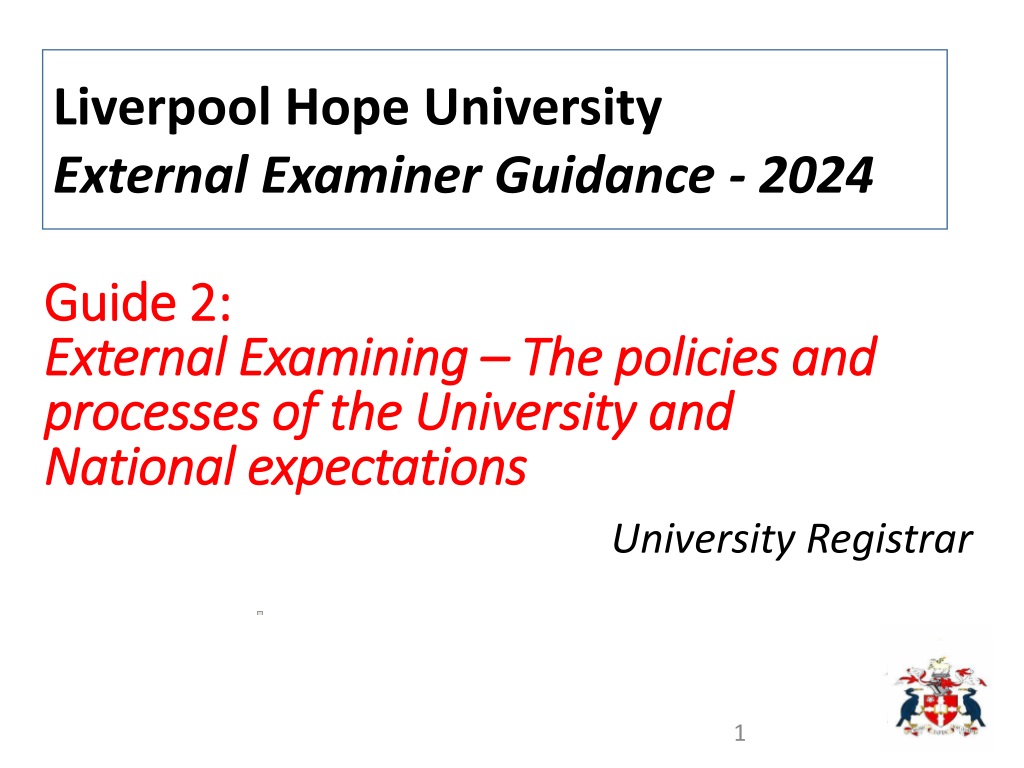

0 likes | 19 Views
This guide outlines the policies, processes, and national expectations for external examining at Liverpool Hope University, emphasizing the importance of external examiners in ensuring academic standards. It discusses strategies for maintaining comparable standards across institutions, the role of QAA Subject Benchmarks and Frameworks, as well as the classification of degree levels. The document also highlights the limitations and responsibilities of external examiners in quality assurance and grading accuracy, aiming to promote fairness, transparency, and reliability in academic standards.

E N D
Liverpool Hope University External Examiner Guidance - 2024 Guide 2: Guide 2: External Examining External Examining – – The policies and processes of the University and processes of the University and National expectations National expectations The policies and University Registrar 1
Three Strategies for assuring that standards are comparable across institutions QAA Subject Benchmarks o “Subject Benchmark Statements describe the nature of study and the academic standards expected of graduates in specific subject areas. They show what graduates might reasonably be expected to know, do and understand at the end of their studies” [qaa.ac.uk] o The QAA are currently in the process of updating Subject Benchmark Statements. 28 new and revised statements have currently been published. o QAA Benchmark Statements 2
QAA Frameworks for Higher Education Qualifications o For example: “Bachelor's degrees with honours [Level 6] are awarded to students who have demonstrated: a systematic understanding of key aspects of their field of study, including acquisition of coherent and detailed knowledge, at least some of which is at, or informed by, the forefront of defined aspects of a discipline an ability to deploy accurately established techniques of analysis and enquiry within a discipline conceptual understanding that enables the student: to devise and sustain arguments, and/or to solve problems, using ideas and techniques, some of which are at the forefront of a discipline to describe and comment upon particular aspects of current research, or equivalent advanced scholarship, in the discipline an appreciation of the uncertainty, ambiguity and limits of knowledge the ability to manage their own learning, and to make use of scholarly reviews and primary sources”. o For details, go to QAA Framework 3
External Examiners o External examining has played an important role in UK higher education since the 19thcentury. o At Liverpool Hope, we value the comments of External Examiners very highly. o In order to provide assurance for stakeholders it is important that External Examiners are familiar with the policies and processes of the University. 4
2. Policies and Processes: [a] Degree Classification In almost all cases Level 6 Honours degrees are classified using the following scheme: o First class [typically 70+] o Upper second class [typically 60-69] o Lower second class [typically 50-59] o Third class [typically 40-49]. Level 7 Masters degrees tend to be classified differently: o Distinction [70+] o Merit [60+] o Pass [50+]. However: o the scale can vary across Universities [especially for Masters degrees]; o each University is able to set its own detailed rules: there is no national benchmark. 5
• Recent guidelines in relation to algorithm composition have been reported by UKSCQA • The research report can be accessed here • The statement reaffirms the sectors ‘commitment to fairness, transparency and reliability in academic standards’ • At Hope we currently have a dual algorithm system to classify undergraduate awards (bachelors and integrated masters). In the coming years we will move to a single algorithm. 6
Role of External Examiners in Quality Assurance o external examiners CAN provide assurance that a University is following its own rules; o they CANNOT, in principle, provide assurance that the University’s classification rules are in line with national standards, o they CANNOT, in principle, provide assurance that “a first class degree in Institution X means the same as a first class degree in all other institutions”. 7
Accuracy and reliability of marking It is sometimes assumed that an External Examiner can provide assurance that each assessment has been given the “correct” mark on a percentage scale. This may hold for some assessments [eg multiple choice tests] but the nature of most assessments means that in many cases, it is unlikely that anyone can mark reliably to a high degree of precision. 8
Reflections: o it is important for all examiners [internal and external] to be aware of the limits to the precision to which some assessments can be graded or marked; o assuming that it will not be possible to identify the precise mark that every assessment is worth, an External Examiner: ought not to impose mark changes for individual students but could usefully provide overall feedback about broad standards achieved by students in relation to Liverpool Hope assessment descriptors/ marking scales, and the appropriateness of assessment tasks and exam questions in relation to program aims and learning outcomes; o in principle, it might be possible to enhance reliability if consideration was given to developing national expectations for awarding different grades [probably at discipline level]. 9
Degree Outcomes Statement For the first time in 2020, it was proposed that providers should publish a degree outcomes statement analysing their institutional degree classification profile and articulating the results of an internal institutional review. The most recent Statement, produced in Summer 2023 is available: The Hope Degree Outcome Statement 10
4. And finally…… We hope you have found this presentation useful. If you have any queries please email Dr Cathy Walsh [University Registrar] at walshc@hope.ac.uk 11